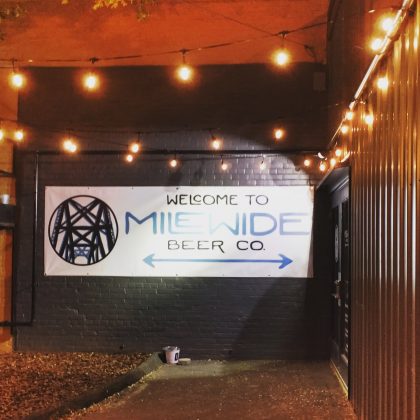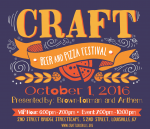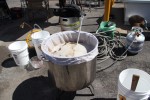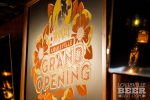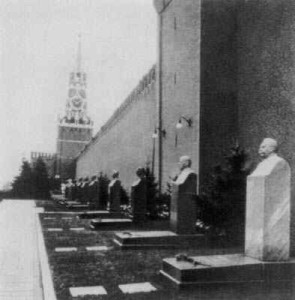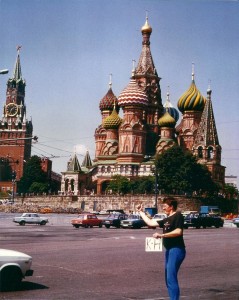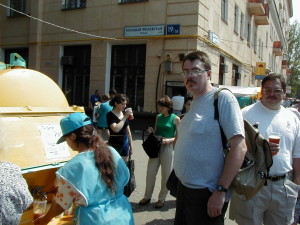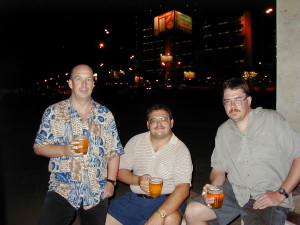A travelogue in three parts.
March 31: (1) A tale of a fateful trip.
April 7: (2) The future is the past.
April 14: (3) Beer hunters lurking nearby.
(2) The future is the past.
It was 1999, and from the beginning of the trip, it seemed a strange and disjointing sensation to be returning at last to a land that had captivated me so intensely earlier in my life.
In particular, it seemed quite wrong to be entering Russia by airplane. Before, back in the decidedly dark ages of the 1980s, I’d arrived in the Soviet capital only after long journeys by train, taking me eastward over a period of days through ever more mysterious and primitive concentric circles of the Warsaw Pact. Being able to effortlessly glide into an airport while ensconced in the belly of a Swissair jet seemed positively corrupt and decadent by comparison. The proletariat would harshly judge me.
A decade later, sprawling, brooding Moscow remained the imperial capital of Communism, at least in physical appearance. Seventy years of urban methodology was loosely draped with the familiar veneer of capitalism’s purported victory in the long running saga of the Cold War. Garish neons, intrusive billboards, cellular phones, car alarms — even the occasional coat of paint — all conspired to trick the unthinking visitor into believing that Moscow had become somehow Western.
Don’t believe it. It wasn’t. Perhaps it is now, but I’m betting against it, even if it’s been 15 years. After all, Mother Russia goes back a very long way.
Still, if I were to return again in 2014, it would not be possible for me to fathom Moscow with the precise clarity of an objective, unbiased eye. I first visited the Soviet Union when I was young and impressionable, during a time of geopolitical ubiquity, when hardly a press conference passed without Ronald Reagan making one reference or another to the evil empire centered in a city that neither Napoleon nor Hitler could capture and hold.
In 1987, people queued around the block to glance for fleeting, rushed seconds at the mummified remains of Lenin, the founder’s fist clenched beneath the eerie glass. Exiting Lenin’s mausoleum in the shadow of the massive red brick Kremlin Wall, the visiting pilgrim walked past idealized busts and burial places of the Soviet Union’s friends and luminaries (“there … that’s John Reed”), then spilled out onto Red Square and girded for the inevitable bargaining for jeans and cigarettes and shirts and shoes.
Perhaps the hushed mercantile conversation was taken off the crowded street and into a dirt-cheap and dirty stand-up eatery, with the deal being sealed later over a shared bottle of vodka while seated on a park bench, watching the dignified old folks shuffle past, the ones who worked so hard for so little while building the nation, their grandchildren circling them like tiny ice cream-smeared Sputniks.
In 1999, with the long and fevered century coming to a close, my days in Moscow were spent thinking and drinking, acting out bit parts from Dostoevsky screenplays, flashing backward and forward from the eighties to the moment, haunted by the past, confused by the present, but still glad that it was no longer necessary to surreptitiously buy beer from the trunk of a cabdriver’s car or the hard currency “Beriozka” shop.
Contemporary capitalism had become familiar and user-friendly: Merely find the nearest kiosk, spend the ruble equivalent of $5.00, and walk away with more bottles of beer than could be comfortably carried, back to where we’d recline well into our cups as our old friends shared their knowledge.
In 1999, both Allan and Kim were living and working in Moscow, where they had first met in the 1980’s while studying at Moscow State University. Better hosts could not be imagined.
We were taken for a surreal tour of the KGB’s own museum. We were hustled to the affluent northwestern outskirts for a meal in a theme restaurant where servers in peasant blouses ladled out ridiculously overpriced provincial-style game dishes to mafia bosses, who were seated astride an indoor, artificial, babbling brook.
We viewed thousands of bootleg compact discs that were being hawked at the huge weekend open-air music mart somewhere west of the center, bought a few, and enjoyed the marvelous Kvass (a lightly fermented, carbonated beverage made from bread and malt) being dispensed from one of the old dreadnaught-grade metal streetside tanks.
We visited a brewpub (now mercifully defunct) that could be reached only after passing through a metal detector, where the beer was mediocre and the international clientele of traveling businessmen thoroughly depressing, but at least the selection of pro-am prostitutes was diverse and entertaining, providing us with many new ideas for marketing like-sized American brewing establishments.
We walked along the Moscow River, viewed the city from the Lenin Hills, found the Patriarch’s Ponds, as yet seemingly straight from Bulgakov’s magical novel, and drank good Baltika draft beer from St. Petersburg on a hot summer’s night while seated on a cement wall at the foot of Kim’s apartment complex, laughing heartily about the proximity of public toilets – out that way, behind the untrimmed shrubbery, where the light bulbs all had been broken.
Still, the excursion into the Russian countryside promised to be the best part of the itinerary.
Next week: (3) Beer hunters lurking nearby.

